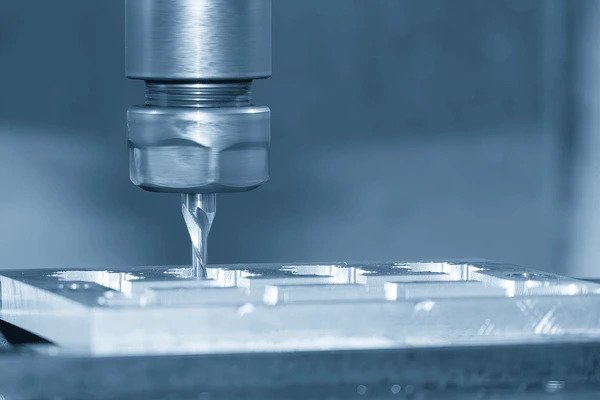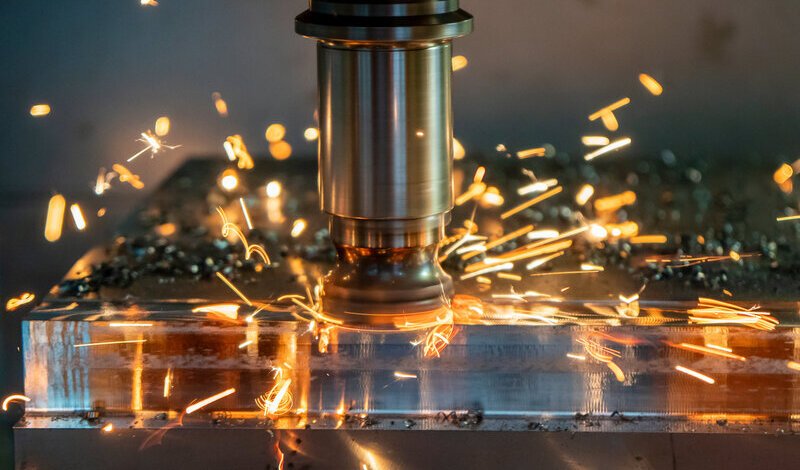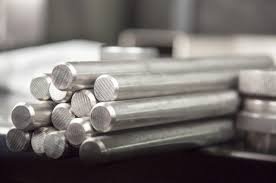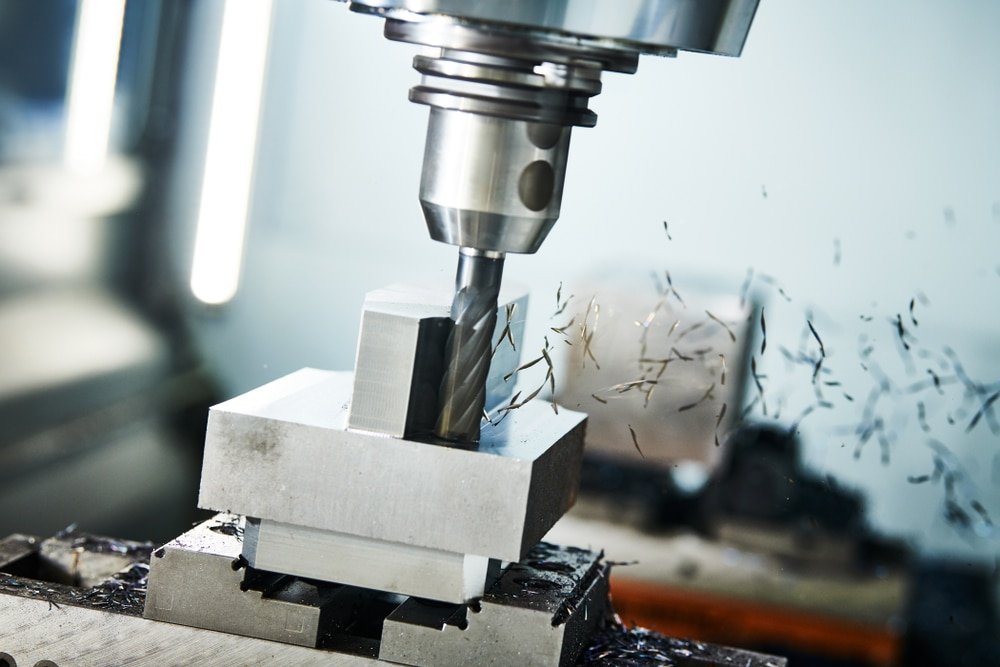Precision CNC Machining is a versatile process that can work with a wide range of materials, each presenting its own set of challenges and considerations. From metals like steel, aluminum, and titanium to plastics, composites, and even exotic alloys, precision machines are equipped to handle diverse materials with varying properties and characteristics.
Understanding the capabilities and limitations of precision cnc machining across different material types is essential for achieving optimal results in manufacturing and production processes.
Materials Preferred by Precision CNC Machining Service Providers
Precision machining services have revolutionized the production of highly accurate CNC machined parts, offering a wide array of materials to choose from. Let’s explore some of the popular materials utilized in precision machining:
Aluminum
Regarded as somewhat exotic in manufacturing, aluminum stands out as one of the most commonly used materials for CNC milling. Its ability to be machined swiftly makes it a preferred choice for CNC machining. With characteristics like lightweight, non-magnetic properties, corrosion resistance, and cost-effectiveness, aluminum finds extensive applications in aircraft components, automotive parts, bicycle frames, and food containers.

Stainless Steel
Stainless steel alloys, prized for their resistance to stains and rust, are highly favored for their strength and durability. This material finds its way into a wide range of applications, from surgical equipment to electronics hardware, owing to its versatility, lightweight nature, and robustness.
Carbon Steel
Another popular choice for CNC machining, carbon steel comes in various formulations to suit diverse application requirements. Renowned for its durability, safety, long lifespan, affordability, and eco-friendly attributes, carbon steel is widely utilized in precision machining processes.

Brass
Recognized as one of the easiest and cost-effective materials for precision machining, brass is selected for crafting intricate parts with sophisticated features. With its smooth machinability, polished finish, brass is extensively used in medical equipment, consumer goods, electronic hardware, fittings, and commercial products.
Titanium
Renowned for its heat and corrosion resistance, titanium finds extensive usage in numerous industrial applications. Its immunity to salt and water corrosion makes it a preferred choice for medical implants, aircraft components, and jewelry manufacturing.
Magnesium
As the lightest structural metal, magnesium is widely employed by precision machining service providers. Offering excellent machinability, magnesium provides strength and durability, making it suitable for various industrial sectors.
Monel
In high demand for CNC machining, Monel is chosen for applications exposed to corrosive environments requiring higher strengths. Although tooling Monel is challenging and requires extensive experience, it remains a popular choice for specific applications.
Inconel
A nickel-based superalloy, Inconel has gained popularity for its advantageous features. Ideal for environments prone to aqueous corrosion or oxidation, Inconel is suitable for applications subjected to extreme pressure and heat.
Apart from these materials, several others like Carbide, Tungsten, Palladium, Invar, Nickel, Niobium, Alloy steel, Beryllium, Cobalt, Iridium, and Molybdenum are compatible with precision CNC machining. Selecting the right material is critical for the success of applications, considering factors like application area, machining activities, and specific requirements.

Considerations for Precision Machining
Material Selection
The choice of material is critical in precision machining. Different materials have varying machinability, hardness, and thermal properties, which can affect machining processes and tool life. Selecting the right material based on the specific requirements of the part is essential for achieving optimal results.
Tolerances and Surface Finish
Precision machining requires tight tolerances and high-quality surface finishes. Define the required tolerances and surface finish early in the design phase to ensure they can be achieved through machining processes. Consider the capabilities of the machining equipment and the expertise of the machinists in meeting these requirements.
Machining Techniques
Understand the various machining techniques available, such as milling, turning, drilling, grinding, and EDM (electrical discharge machining). Each technique has its advantages and limitations, and selecting the most suitable technique depends on factors such as part geometry, material, tolerances, and surface finish requirements.
Tool Selection and Optimization
Proper selection and optimization of cutting tools are crucial for successful precision machining. Choose the right tool materials, coatings, and geometries to ensure efficient material removal, minimal tool wear, and high-quality surface finishes. Regular tool maintenance and optimization can help prolong tool life and maintain machining accuracy.
Fixture Design and Workholding
Secure and stable workholding is essential for precision machining to prevent part movement or deflection during machining operations. Designing effective fixtures and workholding systems tailored to the specific part geometry and machining processes can enhance accuracy, repeatability, and productivity.
>>> Read more: What is Precision Machining?
Machinist Skill and Expertise
The skill and expertise of machinists play a significant role in precision machining. Experienced machinists understand the intricacies of machining processes, tool selection, setup, and optimization. Invest in training and development programs to enhance machinists’ skills and keep them updated on the latest machining technologies and techniques.
Quality Assurance and Inspection
Implement robust quality assurance measures throughout the precision machining process to ensure the integrity and accuracy of machined parts. Perform regular inspections using calibrated measuring instruments to verify dimensional accuracy, tolerances, and surface finish. Address any deviations or non-conformities promptly to maintain quality standards.
Environmental Considerations
Pay attention to environmental factors that can affect precision machining processes, such as temperature, humidity, and cleanliness. Maintain stable environmental conditions in the machining environment to minimize thermal expansion, tool deflection, and part distortion, which can impact machining accuracy and quality.

What can Precision CNC Machining produce?
Precision machining can produce a wide variety of components and parts with extremely tight tolerances and high accuracy. Some examples of what precision cnc machining can produce include:
- Aerospace components: Precision machining is commonly used to manufacture critical aerospace parts such as turbine blades, engine components, landing gear, and structural components.
- Medical devices: Precision machining is essential for producing intricate medical devices such as surgical instruments, implants, prosthetics, and diagnostic equipment.
- Automotive parts: Precision machining is utilized in the automotive industry to produce engine components, transmission parts, suspension systems, braking systems, and other critical components.
- Electronics components: Precision machining plays a crucial role in manufacturing electronic components such as circuit boards, connectors, housings, and heat sinks.
- Tooling and molds: Precision machining is used to produce tooling and molds for injection molding, casting, and other manufacturing processes.
- Precision instruments: Precision machining is employed to manufacture precision instruments such as gauges, meters, optical devices, and scientific equipment.
- Defense and firearms components: Precision machining is utilized in the defense industry to produce firearms components, missile parts, optics, and other critical defense equipment.
- Consumer products: Precision machining is used to manufacture a wide range of consumer products including watches, jewelry, cameras, sporting goods, and household appliances.
Why should you choose MaTec Vietnam as your Precision CNC Machining service provider?

- Expertise and Experience: MaTec Vietnam have more than 10 years of experience and expertise in Precision CNC Machining to the table. Our team of skilled professionals is well-versed in the intricacies of machining processes, ensuring high-quality results for your projects.
- State-of-the-Art Technology: We invest in state-of-the-art machining technology and equipment to deliver precision parts with tight tolerances and exceptional accuracy. Our advanced machinery enables us to handle complex projects and meet stringent quality standards.
- Quality Assurance: At MaTec Vietnam, quality is our top priority. We have stringent quality control measures in place throughout the machining process to ensure that every part meets your specifications and exceeds your expectations.
- Customization and Flexibility: We understand that every project is unique, which is why we offer customization and flexibility in our Precision Machining services. Whether you need prototype development, small-batch production, or high-volume manufacturing, we can tailor our services to suit your needs.
- Timely Delivery: We are committed to delivering your parts on time, every time. Our efficient production processes and streamlined logistics ensure that your project stays on schedule, allowing you to meet your deadlines with confidence.
- Cost-Effectiveness: While we maintain the highest standards of quality and precision, we also strive to offer competitive pricing for our Precision CNC Machining services. We believe in delivering value for money, ensuring that you get the best possible return on your investment.
- Communication and Support: Our team is dedicated to providing excellent customer service and support throughout the entire machining process. We maintain clear and open communication channels, keeping you informed and involved every step of the way.
- Long-Term Partnership: At MaTec Vietnam, we value long-term partnerships with our clients. We are committed to building strong and mutually beneficial relationships based on trust, reliability, and professionalism.
Conclusion
Precision cnc machines have the capability to work with a diverse range of materials, offering versatility and flexibility in manufacturing processes. From metals like aluminum, stainless steel, and titanium to plastics, composites, and exotic alloys, precision machines can handle various materials with precision and accuracy.
By understanding the properties and characteristics of different materials and leveraging advanced machining techniques, manufacturers can produce high-quality parts and components tailored to specific applications and industries. The ability of precision machines to work with a wide array of materials underscores their importance in modern manufacturing and highlights their role in driving innovation and efficiency across various sectors.
